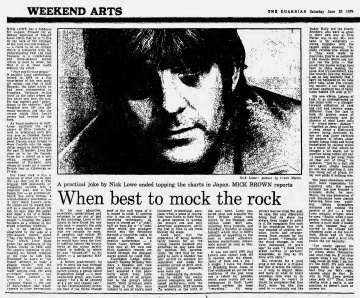London Guardian, June 23, 1979: Difference between revisions
(add more transcribed text) |
(add more transcribed text) |
||
| Line 21: | Line 21: | ||
By his own admission, unreliable, undisciplined and reluctant to get out of bed in the mornings, Lowe is fortunate to have found his way into rock – possibly the only field where such shortcomings are actually an asset. A gangling and untidy 30-year-old, one imagines that he would have been the first to light-up behind the bicycle sheds at the minor public-school in Suffolk to which he was “farmed-off” by his father – a peripatetic RAF officer. | By his own admission, unreliable, undisciplined and reluctant to get out of bed in the mornings, Lowe is fortunate to have found his way into rock – possibly the only field where such shortcomings are actually an asset. A gangling and untidy 30-year-old, one imagines that he would have been the first to light-up behind the bicycle sheds at the minor public-school in Suffolk to which he was “farmed-off” by his father – a peripatetic RAF officer. | ||
A failure academically, he left to work his way through a succession of fruitless jobs, before joining a group called Kippington Lodge - a mud-on-the-wall group, says Lowe, signed “for a 3s 6d advance at a ½ per cent royalty rate” on the record-industry principle that if you throw enough mud at the wall some of it is bound to stick. If nothing else it was an education in recording techniques : 2½ hours to record an “a”-side; half an hour for a “b” side; after which the producer would mix the recording through a transistor radio to gauge its effect on the popular marketplace - a lesson Lowe heeded well: even now all his own and Elvis Costello’s records are mixed through the cheapest stereo system he could find. | |||
Kippington Lodge subsequently became Brinsley Schwarz, a likeable pub rock band who since their demise have achieved a cult popularity which even Lowe admits is out of all proportion to the group’s actual merit. Their principal claim to fame is that they were subject to one of the rock’s most ill-starred promotional exercises, when a posse of journalists were flown to New York at great expense to witness the group’s one and only American appearance, arriving just in time to see them leaving the stage. | |||
Lowe says that the experience of being momentarily famous for all the wrong reasons quashed any ambitions he may have had for stardom. But, paradoxically, the fact that he was party to such a blunder has only served to enhance his reputation and made his eventual arrival at Stiff, without contract or prospects, even more apt. | |||
In challenging the stranglehold in which the major record companies and established performers held the record industry, Stiff became the midwife in the birth of the new wave, Lowe produced what was arguably the first British punk rock record, by the Damned, and various other Stiff acts, including Elvis Costello, and recorded a handful of singles himself, which true to Stiff’s principle of appealing to the snob in record collectors, became mysteriously unavailable almost as soon as they were released. | |||
It was not until 1978 that Lowe’s solo career took off in earnest with the album, ''Jesus of Cool'' and a top- 5 single, I Love the Sound of Breaking Glass. ''Jesus of Cool'' evidenced an ear for the traditions of the pop song a talent for pastiche which some critics felt was tantamount to theft. Lowe himself prefers the term “recycling.” All songwriters borrow from the past, he says, the only difference being that he alone has always been happy to admit to it. He complains that such is his reputation that he is now accused of stealing melodies, lyrics and arrangements from records he has never heard. “Virtually all the chord changes in rock were exhausted 10 years ago” he says. “I think even grand larceny is perfectly acceptable, as long as it’s done with style.” | |||
{{cx}} | {{cx}} | ||
Revision as of 22:01, 13 January 2020
|

